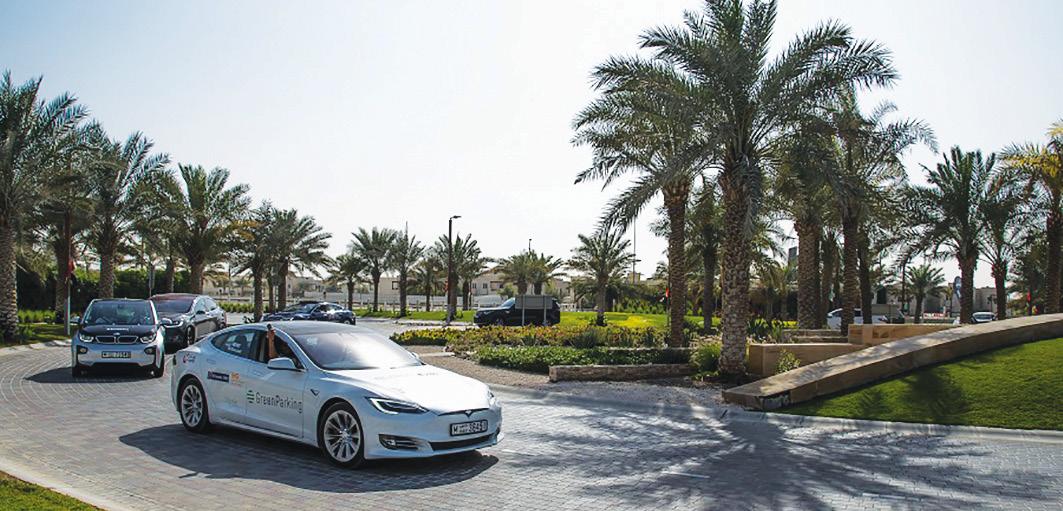
8 minute read
SURVEY SAYS
BUYING IN A PANDEMIC Jorge Bialade, YallaMotor’s general manager, and team look at how new car sales has taken a hit
Asubsidiary of the Middle East’s leading job site Bayt.com, YallaMotor was launched in 2012 and has grown to become the most visited automotive portal in the region.
With the aim of simplifying vehicle research, buying, and selling, it serves over 27,000,000 sessions, more than 138,000,000 page views and more than 13,000,000 car buyers that spend more than 75,000,000 minutes browsing car content that generates more than 1,100,000 leads a year.
Providing visitors to the site with the right set of tools to make a well-informed purchasing decision, it offers a dedicated Car Buyer’s Guide that lists prices, specs, and features for every model sold in the market, along with the latest international, regional and local car news and reviews from the region and beyond. Bundle that with handy shopping tools such as a unique special offers section, an in-depth car comparison tool, and a bustling used car section with over 26,000 always up to date cars, YallaMotor has become the region’s leading automotive portal.
The company recently released the findings of a report that delved into buyer concerns as the Coronavirus (COVID-19) continues to disrupt life in the UAE. Its general manager Jorge Bialade, says that the insights come from the answers of more than 1,200 car buyers across the GCC.
He says that their responses to the online retailer’s survey is helping YallaMotor to understand their perspectives towards purchasing a vehicle.
“YallaMotor is always at the forefront of understanding car buyers’ behaviours,” he notes. “The current COVID-19 situation hit all of us by surprise and now, our number one priority is the health and safety of our employees and all the members of our community. We are in debt to the heroic efforts of first responders, doctors, nurses, researchers, public health experts and public servants globally and locally who lead with example. Their determination is an inspiration and as an organization, we have taken the necessary measures to adapt to the “new normal”.”
According to Bialade, uncertainty is a word automotive industry has been hearing (possibly too much) lately. He argues that the report helps bring clarity to how the pandemic is reshaping the market.
“We decided to shed some light on where
car buyers stand, what they are expecting and how their purchasing cycle has changed.”
He adds: “Another statement we heard a lot was: let us wait until things get back to normal. Whatever we used to experience as the “norm” won’t be there anymore. The fact we might be able to go back to our offices, take a walk, participate in events, drive cars and walk into showrooms does not mean our purchasing behaviors won’t change. COVID-19 forced us to rethink the way we operate while slowly and almost without noticing it changed our behaviours.
“Although we are unsure how long this uncertainty will last, we hope that these initial results will help guide the automotive sector towards their next plan of action.
“Currently, during a time of uncertainty and transition towards new ways of doing things, we are not afraid to say we do not have the answers. However, these initial results could start throwing some light in regards to what will be the real definition of ‘going back to normality’.”
Topping the list of questions is a probe into how the COVID-19 situation has affected their car purchasing.
As expected, the majority of car buyers who were in the market to purchase a vehicle have decided to hold their decision until there is more clarity on how the situation will be in the near future. 64.5% mentioned, due to COVID-19, their decision to purchase a vehicle has been affected. From a qualitative point of view, this means car buyers will no longer be in the market for changing their car, or else, they are now thinking of more budget-friendly options.
With convenience in mind, consumers will be interested in looking into more affordable options and also looking into second-hand vehicles if they were interested in purchasing a new one. More resilient car buyers, a specific group of 35%, have mentioned the current situation has not affected their decision to purchase a vehicle.
Unsurprisingly, buyers in the market are now much more cautious towards splashing out on a new vehicles; taking far longer to make a purchase.
When it comes to the time frame, compared to YallaMotor’s results from the Car Buying Behaviour report it released last year, 64.59% of car buyers stated they make the decision in less than a month. Now, we can see the majority of car buyers will take up to 3 months (39.19%) to make their decision while 40.35% within 3 to 6 months.
Buyers were also asked this year whether they plan to purchase a new car or prefer to opt for certified pre-owned or used vehicle.
YallaMotor also wanted to better understand this preference in regards to a new or used vehicle and the data clearly shows a massive appetite for purchasing a used car. Rounding up the numbers, almost seven out of 10 have the intention of buying a second-hand car, two out of 10 a new car and one out of 10 will consider a Certified Pre Owned vehicle.
While it is a known fact that car buyers are relatively price-sensitive, the COVID-19 situation has made that far more evident.
YallaMotor has found that 74% of the buyers that answered the survey said that reducing prices will positively impact their decision to purchase a vehicle. 11% would prefer to see attractive loan options. 10% would prefer complementary financial assistance throughout the ownership cycle, such as insurance and servicing. The remaining 5% will consider options with less commitment and monthly payments such as lease and co-ownership. This is certainly something new we have not seen before.
Some manufacturers and dealers in the UAE, such as Peugeot, are now offering
60%
interested buyers the opportunity to test drive cars at home without the need to visit the local showroom. These initiatives appear to in line with YallaMotor’s own findings.
While previously 50% of car buyers were willing to visit the showroom at least twice before purchasing a vehicle, things have changed. Now, 56% of car buyers are not willing to go to the showroom to check the vehicle.
This brings a massive potential to online tools and alternative ways to engage with customers. For instance, only 18% mentioned they are not willing to test drive a car at home.
The remaining 82% are open to doing so as long as vehicles have been sanitised, they have a sales consultant with them, and they can book it online.
This also triggered another opportunity such as an online purchase. At this point in time, 6 out of 10 car buyers will consider purchasing a car online.
Deeper information that might be available online through third-party websites plus a concierge service to the customers in order for them to test the vehicle will be essential for the users to purchase the vehicle online.

FINDING PERSPECTIVE
YallaMotor general manager Jorge Bialade says the survey is helping the online retailer’s to adapt to a’new normal’.


HOW YALLAMOTOR WORKS WITH BUSINESSES
For businesses, YallaMotor provides the most comprehensive and flexible choice of advertising solutions to engage with all car buyers in the Middle East whether you are an OEM, Distributor, Used Car Dealers, Certified Pre Owned Dealer, Digital Marketing Agency, PR Agency, Workshop and or Maintenance Company. Working with more than 500 companies across the World it also provides stakeholders with market insights, data, technology solutions and digital and social media marketing consultancy.
A COOL BOX Thermo King and BPW close to realising zero-emission refrigerated trailer dream
Thermo King and BPW say their collaboration to develop a new economical and ecological refrigerated trailer solution can transform the way refrigerated trailers are powered.
The companies have revealed that they have spent the last year, working together to “create a sustainable power solution for refrigerated trailers that will not only be environmentally friendly but also bring transport companies substantial cost savings.”
Both companies are convinced that they will soon deliver to market a reliable and efficient solution “making zero-emission trailer transport refrigeration a reality.”
In a joint-statement, the partners said that they will be communicating major developmental milestones over the coming months with a sneak-preview later this year.
“For decades, Thermo King has considered it our responsibility to lead the refrigerated transport industry and always deliver solutions that our customers expect from us,” said Francesco Incalza, president of Thermo King Europe, Middle East and Africa. “We’re leaders in electrification, we have the largest range of zero and low-emissions solutions in all segments of the market.
“Our customers value us for our commitment to the continuous advancement of the industry. The partnership with BPW perfectly reflects this approach and brings us closer to meeting our 2030 sustainability goals and combatting exhaust, CO 2 and noise pollutions in our industry.”
Thore Bakker, General Manager Trailer Solutions & Mobility Services at BPW, adds “In times of climate change, new traffic regulations in urban areas, the transport industry is more than ever challenged to find new ways of doing business economically and ecologically.
“Together with Thermo King, BPW is addressing the urgent problems of refrigerated transport, whose refrigeration units are still powered by a separate diesel engine today. By combining our competences as technology leaders for freight transport solutions we can make temperature control systems more environmentally friendly through new energy concepts in the trailer. This will also have a positive implication to the Total Cost of Ownership of the freight forwarder along the transportation supply chain.”

NEXT ISSUE: WHY SAUDI ARABIA IS OUTSTRIPPING THE GCC MARKET, A6 TEST DRIVE, NEW TRAILER TECHNOLOGY, AND MUCH MORE!








